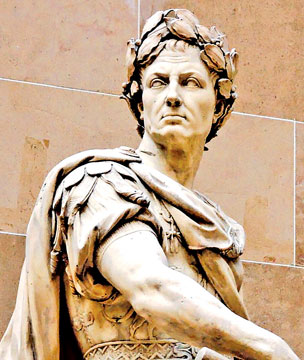|
Julius Caesar:
The unholy exit of an emperor
By Premasara Epasinghe
Caesar (Gaius) Julius, (100-44BC) was a Roman General and a
statesman. He was a great military commander and a brilliant politician.
He defeated formidable rivals to become the dictator of Rome. After the
death of Sulla, Caesar became the military tribunal. As "Ponifex
Maximus," he directed reforms in 63 BC that resulted in the Julian
calendar. He formed the first triumvirate in 60 BC, with Pompey and
Crassus instituted agrarian reforms and created a Patrician - Plebeian
alliance. Julius Caesar, initially captured Gaul for Rome (58-49),
invaded Britain (54 BC). The senate demanded to disband Caesar's Army,
but he refused. This led to a civil war with Pompey. At Pharsalus,
Julius Caesar, he made Cleopatra his queen. After further victories,
Caesar returned to Rome in 45 BC and received many honours, culminating
in the title for dictator of life.
Ides of March
He introduced many popular and worthy reforms. But, his growing power
aroused resentment. He was assassinated in the Senate on March 15 by a
conspiracy led by Cassius and Brutus.
 |
|
Julius Caesar |
March 15 is known as Ides of March. It is associated with Caesar's
death. "Ides Day" is in Roman Republican calendar. It fell on the eighth
day after the nones of each month - March 15, May, July and October and
13th of other months. The Romans were very superstitious. They lived in
a world full of unexplained phenomena, which they chose to interpret in
supernatural rather than scientific terms.
They believed in the reading of omens to predict the future. It was
raised to the status of science. The Romans believed the future could be
predicted by reading the entrails of sacrificial animals, the liver and
heart being of particular importance. Before his murder, Caesar killed
an animal, opened up, to his horror, he found that the animal had no
heart. Further, there were other bad omens too. Gaius Julius Caesar,
played a crucial role in transforming the Roman Republic into the Roman
Empire.
Bad Dream
With the conquest of Gaul, the Roman Empire extended as far as the
Atlantic Ocean. Caesar proclaimed himself dictator for life, and set
about reforming Roman society. Senator, Marcus Brutus one of his closest
friends and a group of Senators wanted a return to the traditions of the
Roman Republic, and vowed to end Caesar's dictatorship.
The conspirators were Marcus Junius Brutus, Servilius Casca and
Tillius Cimber. Caesar's third wife was Calpurnia Pisonis. She was a
strong, educated woman who did not generally believe in superstitions.
Strangely, she believed the terrible nightmare. She dreamt, Caesar badly
injured and streaming with blood. In the morning, she told Caesar about
the dreams and advised her husband to postpone the Senate meeting.
Plan to kill
Brutus said, "Caesar, you are a brave man. Are you to pay attention
to a woman's dream. This persuaded Caesar to attend the Senate.
The conspirators easily got their victim. They planned to execute
their plan in one of the following ways. To kill Caesar on his favourite
walks on sacred way, to push him off the bridge, when attending the
gladiatorial show, killing Caesar in the Senate. Ultimately they decided
to kill him, in the Senate House.
Ides of March 15 dawned. Julius Caesar proceeded to the Senate House
in a procession. On his way, a blind-soothsayer shouted "Caesar - Beware
Ides of March." Caesar smilingly replied "Ides of March has come." The
blind man replied "Caesar, Ides of March has come, but not yet gone".
Brutus instructed the officials to take the blind soothsayer away
immediately.
When Julius Caesar arrived at the Senate, all the Senators arose. The
"Plotters" stood near him. Tillus Limber was the first to approach him.
Et tu Brute
They quickly unsheathed their daggers. Servilius Casca struck him
with the point of a blade on the left shoulder. A man who fought many
battles, Caesar was completely taken by surprise. He was unarmed. Then,
Cassius Longinus attacked Caesar's face. His closest Decimus Brutus
stabbed him behind. Caesar could not believe his eyes.
Caesar said, Et u Brute - ("You too Brutus"). He further uttered,
"Kai su o Teknan (even you lad).
The blood was gushing from all over the body. He fell at the foot of
Pompey's statue. The floor turned blood red. The Great Emperor, one of
the greatest Roman conquerors - Julius Caesar (102-44 BC) had 35 wounds
in his body due to the brutal attack before he breathed his last.
Caesarean operation
Today, you often hear the word "Caesarean." It is the delivery of a
baby by surgical incision made through the abdomen and uterus of the
mother, usually recovers quickly, without complications. The procedure
is named after Julius Caesar, who is believed to have been born in this
way. |

